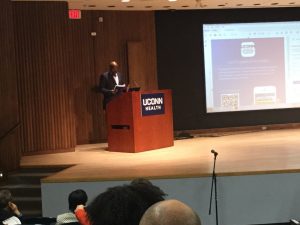Connecticut Convergence Institute for Translation in Regenerative Engineering
Fellow in Health Disparities Elimination and Community Action
Postdoctoral Fellow position in Health Disparities
Connecticut Convergence Institute for Translation in Regenerative Engineering at the University of Connecticut is seeks to hire a full time, Postdoctoral Research Fellow position in the CT Convergence Institute.
The Health Disparities Fellow will work closely with the Chief Executive Officer and Assistant Director of the Connecticut Convergence Institute on Health Disparities related initiatives and will contribute to research and community engagement initiatives associated with the Connecticut Convergence Institute Health Disparities Core Projects. In this capacity, the fellow will work on a new National Academies of Science, Engineering and Medicine Roundtable on Black Men and Black Women in Medicine, Engineering and Science. The fellow will be engaged part time to work with the development of Perspective papers and surveys related to issues facing Black Men and Black Women in Medicine, Engineering and Science. The Fellow will also work with members of the Roundtable on formulation of follow on projects from ideas generated from the Roundtable. In addition, the Fellow will work on community health disparities projects funded by an Aetna Foundation Community Partnership Grant to the Connecticut Convergence Institute. The Fellow will also serve on the editorial board of the Journal of Racial and Ethnic Health Disparities, published by Springer Nature and having its home at the Connecticut Convergence Institute at UCONN.
The successful candidate must hold a terminal professional degree (e.g. Ph.D. M.D., and/or M.P.H.) and have demonstrated potential for success based on scholarly record and demonstrated interest in health disparities, and have the ability to work in collaboration with clinical, translational and/or basic scientists.
A curriculum vitae and a cover letter (in pdf files) and questions regarding this search should be directed to Dr. Lakshmi Nair, Associate Director of the Connecticut Convergence Institute at nair@uchc.edu.
 By Cato T. Laurencin, M.D., Ph.D.
By Cato T. Laurencin, M.D., Ph.D.